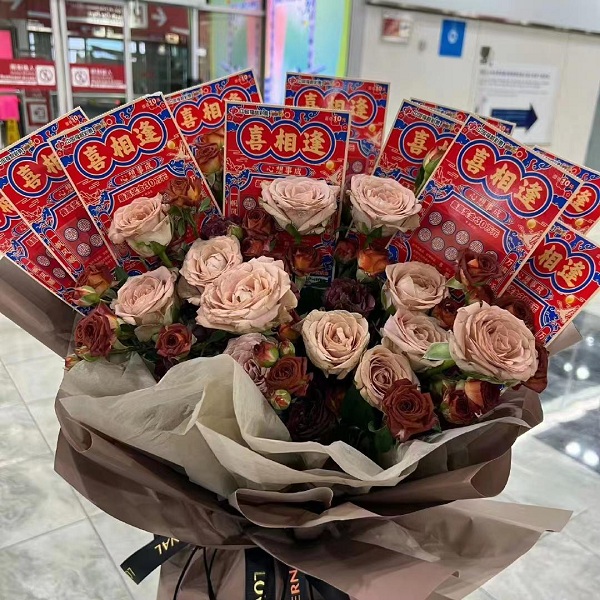Younger generation fuels lottery craze

Flower bouquets with lottery tickets are popular among young people. [Photo provided to chinadaily.com.cn]
Increasing numbers of younger people have been spotted handing over their money at lottery retailers. From lottery bouquets with flowers to lottery cakes and wedding gifts, they are keen on anything made of scratch-offs.
A 23-year-old woman surnamed Tan in Nanning, Guangxi Zhuang autonomous region, has been playing the lottery for three or four years. She buys at least one lottery ticket a day, sometimes as many as a dozen. The highest prize amount she has won is 500 yuan ($68), which she received in cash. She has kept the money as a memento.
It appears that younger people are making the lottery a regular pastime. Buying tickets has become a popular social activity. Lottery sales totaled about 274 billion yuan in the first half of 2023 — a year-on-year increase of around 92 billion yuan and a 15-year high.
One reason for the growth is that lottery tickets have come to occupy a significant place in the social lives of young people. The latest fad is to give lottery tickets in mint condition to others as gifts in creative ways.

A birthday cake decorated with lottery tickets is popular with young people. [Photo provided to chinadaily.com.cn]
So it's only natural that enterprising businesses look for ways to profit from the craze.
In the downtown area and busy streets of Nanning, lottery stalls, stores and vending machines can be found in abundance.
"Some young people bring lottery tickets here and ask us to make them into bouquets," said a woman surnamed Huang, the owner of a flower store.
Huang sells many versions. The most popular bouquet, which costs 198 yuan, includes a number of 10-yuan lottery tickets. Other merchants sell cakes and wedding souvenirs that include scratch-offs.
Why are young people so willing to spend their money on lottery tickets, especially considering the extremely unfavorable odds of winning big? The reasons differ.
Lu Yimin, who is pursuing a doctorate in economics from Guangxi University of Finance and Economics, said young people are doing it mainly out of herd instinct. Another explanation is that so-called wage slaves need an outlet to relieve the pressure of work. Some do it just for the thrill, or the idea of getting rich quick.
A woman surnamed Su is a regular purchaser. "I buy one every time I go shopping with my friends," she said. She is still waiting to hit the jackpot.
Chen Yi, a psychologist in Guangxi warned that people should keep the fad within the bounds of what they can afford to lose, because in the long run they most likely will lose, despite occasional small payoffs.
